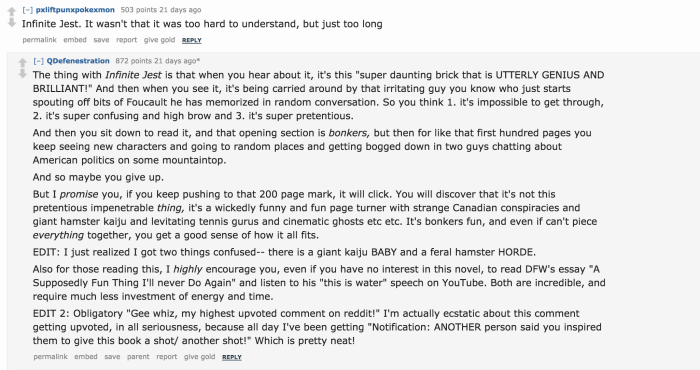Before I begin, I thought it would be nice instead to share a response to the reddit question “Have you ever had to stop reading a novel, because it appeared to be beyond your intellectual capabilities? If so, what book was it and why?”

After about a month and a half of reading, I finished Infinite Jest. God it feels satisfying to write that.
In a way, finishing the book threw my life into disarray. I could barely function for the rest of the week. To cope, I spent an absurd amount of time reading theories online concerning the ending, contentious plot points, and specific themes / messages. Along with many of the other readers, this first thing I wanted to do upon finishing was start over. I suppose this was intentional on DFW’s part and sort of a meta point.
Parting with the book ironically felt akin to giving up an addiction. The book was quite literally within 10 feet of my body for the last month and a half, and I can’t help but feel like something has been missing since. I also couldn’t bring myself to pick up anything new to read for a few days as recovery felt like a necessity.

When I first closed the book I attempted to write my immediate thoughts as kind of a way to make sense of everything.1 Although I won’t reproduce what I wrote at the time, I mainly was stuck grappling with the lack of resolution at the end of the novel as well as piecing together the specific themes and messages being conveyed. It’s easy to get bogged down by the complexity of the plot, the abundance of characters, and the meaning of the entire thing.
All that aside, I think the most important thing I realized upon finishing, is the sincerity which DFW was trying to convey while writing. Infinite Jest isn’t meant to be an ironic detachment of a novel. I believe that’s why the feelings I had expressed above lingered for so long. The sentimentality of the entire thing feels very real. The pain feels authentic. Part of this may be due to the maximalism the book employs, as nearly every possible detail of each character’s life is fleshed out. Or maybe it’s due to the novel’s perfect balance between humor and sadness and how often the line between them is blurred. Or maybe it’s because how much of what is experienced by the characters is personally relatable, even if the reader isn’t a genius tennis player nor a recovering alcoholic nor a depressive, suicidal drug addict. DFW may have been all of those, but that doesn’t necessarily make his fears and feelings foreign to the reader. Perhaps DFW’s sentiments towards his readers are akin to JOI’s sentiments towards Hal expressed near the end of the novel.
I realize that the above points aren’t necessarily new pieces of analysis. Instead they provided an anecdote from my own experience. This was written more or less as a form of therapy to conclude the experience of first reading through the novel. I don’t feel fully recovered yet, but I definitely feel like I’m taking the first step. Even so, I’m still going to spend who knows how long continuing to reflect on what it all means.
Footnotes
1. For the last 200 or so pages, I had the song “I Want Wind to Blow” by The Microphones stuck in my head, which I think creates a pretty good atmosphere / mood for the end of the novel. Even if you never read this book, I recommend giving the song a listen!
Useful Links:
Steve’s Infinite Jest Utilities Page
Series of Interviews DFW gave on Infinite Jest
I Just Read About That…
Boston’s Infinite Jest
What Happens at the End of Infinite Jest?
One thought on “Final Thoughts on Infinite Jest”